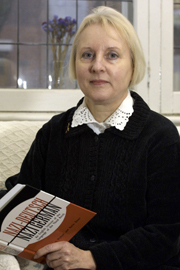
Translating the language
of the Third Reich was draining, says Karin Doerr.
Photo by Andrew Dobrowolskyj
|
by Frank Kuin
Compiling and translating the language of the German Nazis — a vocabulary
rife with terms like “race defilement” and “extermination”
— has been a draining experience for Karin Doerr, who teaches German
at Concordia.
Doerr has co-authored the newly published Nazi German: An English Lexicon
of the Language of the Third Reich, a comprehensive dictionary of
the words and phrases used by the Nazis during their 12 years in power
(1933-1945), which culminated in the Second World War and the Holocaust.
Together with Robert Michael, a professor of European history at the University
of Massachusetts Dartmouth, Doerr has gathered 6,500 Nazi words and phrases,
and provided literal English translations and definitions as well as brief
explanations of their often hidden meanings.
For instance, the word Umsiedlung, which literally means “resettlement,”
was also used evasively to refer to the forced deportation of Jews to
ghettos and then to death camps in Eastern Europe, Doerr explained.
“This whole subject is not easy to deal with on a prolonged basis,”
said Doerr, a German native who has lived in Montreal for 25 years, of
her submersion into an often-coded language of deceit and destruction.
Still, she felt the Nazi vocabulary had to be systematically compiled.
“It’s a chapter of the German language,” she said. “A
negative chapter, yes, but history demands that you have access to this
type of language.”
Surprisingly, Nazi German is the first dictionary of its kind to
translate the Nazi vocabulary into contemporary English (there have been
German-German lexicons). Published by Greenwood Press in the U.S. and
England, it is intended primarily as a reference guide for researchers.
“We found that there was no sufficient English dictionary that explained,
especially to the English-speaking researcher, all the terminology pertaining
to that era,” Doerr said.
Indeed, she has found that English-speaking researchers often throw Nazi
German phrases into their texts without properly explaining their meaning.
For instance, she recently came across the word Sonderbehandlung
in an English work, neither translated nor explained.
Literally, Sonderbehandlung means “special treatment,”
but in German concentration camps, it meant torture and execution.
“This kind of Nazi jargon creeps into scholarship,” Doerr said,
“but you can’t just use it as if everyone knows. You have to
convey to the reader what it meant, and be very clear about it.
“With a dictionary like this, it becomes very easy to verify what
phrases and abbreviations mean. It shows how this language should be used
today in scholarship.
“It will be useful to round out our understanding of these terrible
years and to even thwart Holocaust deniers,” she added.
“We had to be very careful not to perpetuate the tone and the language
of that time,” Doerr said. “Nazi terminology is a very harsh
language. We did not want to reiterate the viewpoint of people who used
this language to deny others their status as humans.”
Thus, literal translations were used, as well as explanations in contemporary
English, which “rendered it in a more compassionate tone,” she
said.
The term Vernichtung (extermination) is an example. “Today,
we do not speak of the extermination of people,” Doerr explained.
“We say people were murdered.”
Thus, the dictionary entry reads: Vernichtung. Destruction, eradication,
extermination. Intention of Nazi Germany to murder all Jews. In this sense,
the work is also meant to be a linguistic monument to the victims.
Not all terms in the dictionary are directly related to the genocide,
though. Extracted from years of reading as well as interviews with Holocaust
survivors, they include terms and phrases used by the military and the
Nazi government, as well as by the general population.
“What becomes apparent is that the genocidal component touched every
aspect of German life,” Doerr said.
A book launch of Nazi German: An English Lexicon of the Language of
the Third Reich will be held by Concordia’s Simone de Beauvoir Institute,
of which Karin Doerr is an active member, on Tuesday, March 19, between
5 and 7 p.m., at Samuel Bronfman House, 1590 Dr. Penfield (corner Cote
des Neiges).
|
|
|



